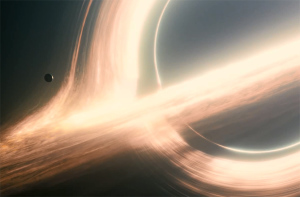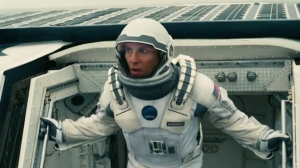by Shimbo
You and I will never see space. Chances are, our children won’t see it either. For us, tales of space exploration, real exploration, will only ever be fables we tell our grandchildren before they tuck away for the night.
It’s this longing for space, for the unknown, that drove (and continues to drive) science fiction for decades.
From The Earth to the Moon to Star Trek, hurling our bodies out into the black void of space in search of something new has been the stuff of dreams.
Christopher Nolan’s Interstellar is no different in that regard.
There’s been much made of the decision to release the film early in IMAX 70mm, but after seeing it in the larger format that was intended by Nolan, there’s simply no other way to see the absolute beauty, scope and grandeur of this film.
A couple of points before I go on: First, I’ve been pretty down on Christopher Nolan as of late. Part of it is due to his films largely coming across as overly serious, treating flights of fancy as fodder for funerals. His muted color palates mirror his brooding stories. Prior to Interstellar, the only Nolan film that I was 100 percent behind was The Dark Knight, but even that admiration has frayed and yellowed with time, something I thought I would never feel when I saw it. Perhaps it was his questionable desire to end the Batman trilogy in the most lackluster and confusingly hostile way possible a la The Dark Knight Rises, a film that nearly manages to suck out and blow away everything good that came from the previous two films.
Maybe it was the fact that while Nolan devotees went ape shit over Inception, I simply fell asleep in the theater, waking up with no appreciable desire to try to sit through the film again (I’ve since watched the film in pieces here and there, coming away completely nonplussed). I say all that to say my appreciation for Nolan and his oeuvre is ephemeral at best.
Secondly, when deciding to see Interstellar on the biggest screen possible, I lucked out with the only choice being the Lockheed IMAX Theater located in the heart of the Smithsonian’s National Air and Space Museum here in D.C. In a way, seeing this film surrounded by so much history of flight and space travel brings with it a sense of sentimentality that’s almost cheating in nature, but then again, no one’s keeping score, but I feel it does matter, for reasons I’ll get into later in the review.

With the help of astrophysicists, ‘Interstellar’ boasts some of the most realistic depictions of space phenomena.
As I mentioned before, Interstellar is a beautiful and grand film. Using very little CGI and employing astrophysicists like Kip Thorne to aid in the faithful rendering and creation of technically accurate wormholes and black holes gave this science fiction film a stronger grounding in science, which also seems to create a polarizing division in some as to the “authenticity” of the film, because for every moment where Nolan “gets it right”, there are other moments some see as complete fantasy, which somehow in their minds negates the science. I don’t see anyone making that same argument about Star Trek or Star Wars, but then simply using NASA as a basis for a science fiction film for some demands more use of fact than fiction, when it shouldn’t matter when it comes to telling a good story.
Speaking of story, the vision created by Nolan brothers of a gentle dystopia not so far off where the Earth is teetering on the brink of collapse, as dust storms and rotting crops affect the population hits far closer to home as the narrative marries the past with the future by opening the film with interviews that evoke the Dust Bowl era of the 30’s with future projections of how mankind will deplete the Earth of resources past a breaking point. The denial of climate change mixed with population booms certainly threaten our future, according to which set of projections you look at.
The theme of past and future is also found in the hero of Interstellar, Coop (played as a bookend of sorts to True Detective’s Rust Cohle by Matthew McConaughey), who as a former engineer and test pilot for NASA spends his days caked in dust and a sense of longing as a corn farmer raising his two kids along with the father of his late wife (a stoic, if not detached John Lithgow).
One of the most affecting scenes of the film comes early on when Coop goes to a parent/teacher conference where he is informed that his daughter, Murph (Mackenzie Foy), is causing trouble in class by bringing in “outdated” textbooks that refute the current and accepted belief that space travel was nothing more than propaganda, with historical events such as the Moon Landing being a perpetrated hoax. As ridiculous as this seems, the very notion of rewriting history in education is something very real and just as dangerous today.
Sure there are familiar tropes at play such as the child who’s more perceptive than her father as she tries to bring what seems like ghosts to his attention, only to have it end up being something else. To be sure, Interstellar is full of these heavy handed moments of “oh…well” which are certainly hallmarks of Nolan’s career, but simply serve as minor quibbles do little to injure the whole.
Once we finally get into space with the crew which includes Amelia (Anne Hathaway), Romilly (David Gyasi) and Doyle (Wes Bentley), Interstellar truly begins to take flight (an unavoidable pun). Joined by along with TARS, a weirdly composed yet freakishly droll robot in the shape of a metal box (gamely voiced by Bill Irwin), who serves as both a comparison and antithesis to H.A.L. from 2001: A Space Odyssey, the crew begins it’s years-long journey to an anomaly identified by what remains of NASA as a wormhole to another dimension. This is important, because the hope is that there are habitable planets on the other side that will save the lives of those stuck on a rapidly dying Earth.
As in other sci-fi fare, the crew weren’t the first to travel through the wormhole in search of a habitable planet, so their mission is to find which of the planets the previous explorers contacted and sent a signal from in hopes that the planet they choose is the right one.
The first planet the crew chooses is based on the strongest signal, and also becomes the one in which the entire story turns. It’s also here where audiences are asked to deal with the concept of relativity, in which due to the gravitational pull of the planet, simply landing on the planet’s surface would literally turn hours into years. As it happens in pretty much every sci-fi film, nothing ever happens as planned, so a trip that was supposed to take only hours (each hour on the surface would equate to a couple years back on the ship), ended up taking 23 years by the time Coop and Amelia returned.
This sets up the second extremely affecting scene of the film, as Coop returns to 20 years of messages from his children as they grow into adults (Casey Affleck, Jessica Chastain). McConaughey conveys the sort of raw emotion that is nothing short of heartbreaking as he sees life flash before his eyes as he misses out on a family that’s aged decades while he’s only been gone a couple years.
From here Interstellar evolves into a race (relatively) to return home, while turning from a film about exploration into an action film with a pronounced villain, which both makes sense and no sense at the same time. It is also at this point that the film seems to lose some viewers, as the story switches tone in a ways that strains credulity. Again, something I’m completely OK with.
The film itself is not without flaws, in fact, there are pretty big ones. For me, Anne Hathaway’s Amelia quickly becomes an unwelcome presence, and while she doesn’t fall into the love interest category, her peculiar balancing act between love and science bear themselves out in a very awkward way, even if she may be right in the end. Other characters seem more like expository cardboard than fleshed out, which isn’t a huge problem, since they’re Nolan’s tools for exposition, but it’s easy to see the stories that are missed.
The score by frequent collaborator Hans Zimmer often comes across with the weight of a sledgehammer to the back of the head, even during the few moments when it’s appropriately used. However, when it works, it works to great effect, elevating the tension in the film to lofty heights.
In many ways, Interstellar is a mixed bag, but the strengths presented far outweigh the weaknesses. This was verified to me at the conclusion of the film, when I walked out of the Lockheed theater and I found myself instantly emotional as I looked out into the Air and Space Museum, looking at the life-sized replicas of SkyLab, an Apollo capsule and lunar landers. I found myself crying because of what Interstellar showed me, and at that moment I realized what the big deal actually was: We need movies like Interstellar to remind us of our love affair with space.
Throughout the years, good men and women have given their lives in the pursuit of space exploration. Nolan perfectly encapsulated this spirit in the face of the blackness of an environment that would kill in seconds, and yet the desire, the need to see what’s out there still burns bright, because it has to. Interstellar is a film that should be shown in every classroom, to every child so that time and tide will never serve to diminish our love affair with space, no matter what shape the world is in, or what governments are in power.
So if the biggest crime of this film is the idea that “love conquers all”, so be it, because it’s only our love of space and the unknown that will ever hope to see future generations make it to the other side of the galaxy or universe…wherever that may be.
Hashim R. Hathaway (Uncle Shimbo) is the host of the Never Daunted Radio Network, and proud father to NeverDaunted.Net. You can reach him on Twitter @NeverDauntedNet

